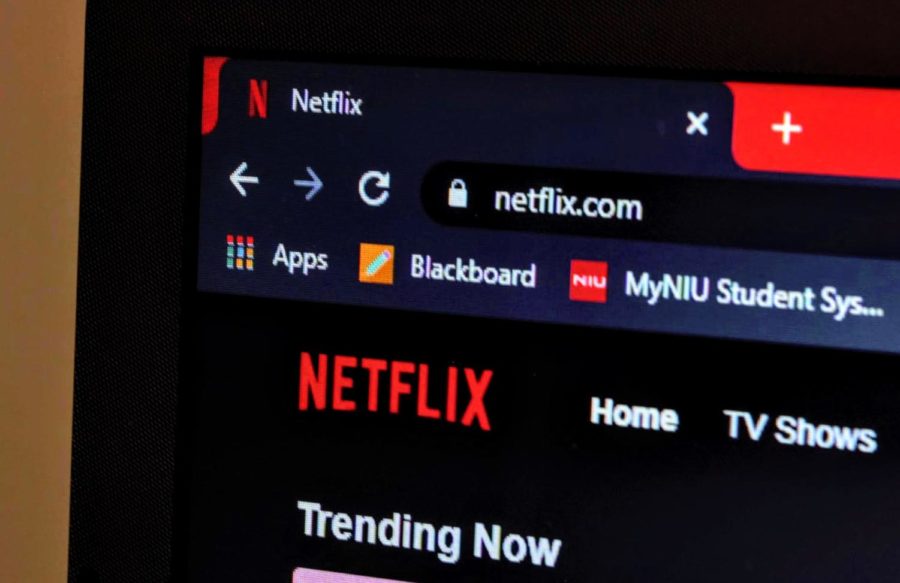Netflix experiment won’t limit account sharing
The Netflix home page shows a list of trending shows on a laptop screen.
April 9, 2021
Netflix is considering policy enforcement changes that may make password sharing between friends and family more difficult. The goal is to make Netflix a single household service. This is a bad policy choice because it will either be ineffective at doing its job (stopping Netflix piracy) or it will negatively impact customers who follow all of Netflix’s rules.
Password sharing with many friends is bad from a business standpoint because no company is going to be worried about the people pirating their product or service. That is the express purpose of the potential new enforcement policy.
Select users of Netflix received a message to verify their account if they were not the primary account holder while on Netflix, according to Gammawire. When presented with this message, users can either have a code sent to the account holder (text or email) and then type the code in, or they can click Verify Later and continue watching Netflix. It hasn’t happened more than once to the users affected by the message, and clicking Verify Later sent the message away. However, Netflix could implement the appearance of this message for all users. Netflix Research says Netflix uses something called an A/B experiment “to test nearly all proposed changes to our product.” This means that some users will experience a change while other users will experience no changes. It is unknown if this change will be absorbed into the default Netflix experience or not.
Account sharing has always been against Netflix’s Terms of Service. Section 4.2 of the terms of service reads, “The Netflix service and any content viewed through our service are for your personal and non-commercial use only and may not be shared with individuals beyond your household. During your Netflix membership, we grant you a limited, non-exclusive, non-transferable right to access the Netflix service and view Netflix content through the service.”
This means sharing passwords with your friends isn’t allowed unless they live with you. It also means that using your parent’s Netflix account while in college isn’t supposed to be allowed either. Historically, there has been little issue with this section of the terms of service and Netflix hasn’t enforced this rule.
Netflix plans limit the number of screens that can display Netflix at the same time but do not limit the number of devices that can be logged in at once. At the highest level, as long as no more than four screens are displaying Netflix, any number of devices can have the same account tied to it.
The “crackdown” on account sharing may be linked to the pandemic. The LA Times wrote that in mid-2020, OnePoll, in conjunction with Tubi, conducted some market research finding that 42% of Tubi customers said they shared or received passwords since the start of the pandemic. It would not be surprising to find similar statistics in other streaming services such as Netflix. Leaders at Netflix may want to capitalize on lost revenue by encouraging users to buy their own accounts with this new program.
This crackdown may negatively impact families if the Verify Later option is eliminated, which is necessary to make the program effective at reducing password sharing across households, which is what Netflix wants. The person whose phone number or email is linked to the account may not be home all the time. If the account holder travels for work it may be difficult for their children or spouse to contact the account holder for the verification information. It also would be another irritating message and verification for someone just trying to relax to get through.
The only real way that this program can be effective at its goal— curbing multi-household use— is if the Verify Later option is either reduced or not available. Users could easily ignore the function and never bother to verify their account. Other than a potential guilt factor, there is hardly an incentive to try to verify from a multi-household account. Netflix’s Premium plan clearly assumes that it is going to be used across households.
It is unreasonable to assume that the four screens of simultaneous use offered by the Premium plan are intended to be used by just one family in one home. Assuming the Verify Later option is limited, there is little reason to buy Premium anymore, if this system were to go into effect. The average American household has 2.63 people, according to Census Bureau data, reports The Pew Research Center. Without an account being used across multiple households, even by raising the average number of people per household, the Premium plan wouldn’t be worth it. For college students living in dorms using their parents’ Netflix password, this will make it more difficult to access a service that the parents intended for their child to use.
Netflix CEO Reed Hastings specifically promised password sharing with your kids is completely fine in a 2016 interview with CNBC. Despite this promise, the fact remains that a request to verify accounts would make it more difficult for families with parents who travel for work, or students in college to access a service paid for them to use.







